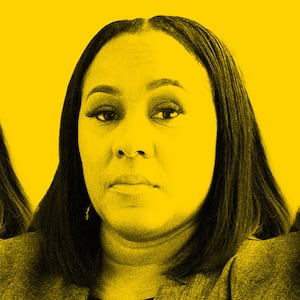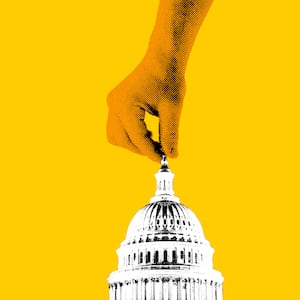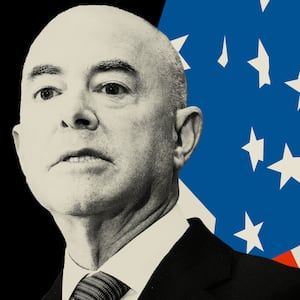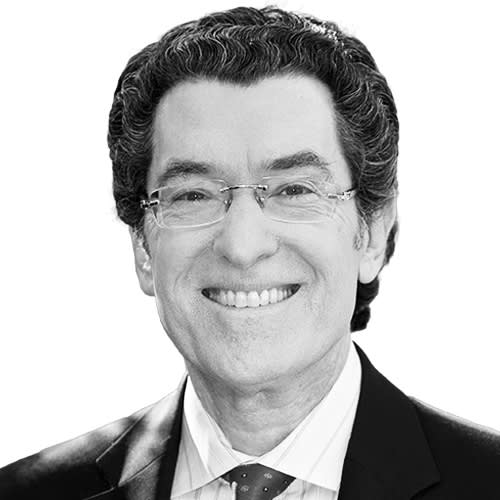Thursday saw closing arguments in Donald Trump’s New York civil fraud case, one of the seemingly innumerable legal challenges Trump faces all stem from his alleged frauds—civil and criminal—he has perpetrated on the public. In the New York case, he is fighting to hang on to his businesses, but its trajectory also teaches us a great deal about his coming fights for his freedom in the criminal fraud cases.
The inescapable headline coming out of Thursday will be Trump’s lashing out at Judge Arthur Engoron and Attorney General Letitia James when the former president was allowed to address the court. Even though Judge Engoron ruled he could only talk about the evidence and relevant facts of the case, Trump barreled forward—ranting about supposed bias, bemoaning how he has been victimized, and claiming the entire case was a “political witch hunt.” He even ludicrously demanded that he should receive damages.
But that headline is a bit misleading because there was actually an interesting and important substantive debate Thursday about whether the state made its case. As we explain in a major new report, Trump’s and his counsel’s colorful antics have often overshadowed the more legally important events. That has included significant blows landed by both the prosecution and the defense. The bottom line of our analysis is that Trump is going to lose and, if anything, his legally irrelevant outburst was a temper-tantrum triggered by his knowledge of the coming negative outcome in the case.
To understand why, consider the closing argument that was made by Trump’s lawyers, led by the normally capable Chris Kise. Perhaps to placate his client, he continued to focus on weak points that the judge had already rejected or that were legally irrelevant.
For example, he repeatedly hammered away at the notion that this was a victimless fraud since the loans were repaid—going so far as to say that thinking otherwise was “insane.” Trump produced multiple witnesses from Deutsche Bank to testify that there were no defaults on the bank’s loans to Trump. How, the defense went, could there be an intent to defraud if no one was harmed? Trump himself also parroted this argument on Thursday, maintaining that the banks made all their money back.
But that is legally irrelevant: victim loss is not needed to prove intent to defraud. Under the law, a fraud with no victims is still fraud. Like a shooter who misses, the fact that the fraud did not cause default does not exonerate the wrongdoing. Besides, there was loss, because banks would have demanded higher interest rates had they known the truth.
Kise also attacked Trump’s former fixer Michael Cohen, treating him as the government’s star witness and arguing that he was the only witness that could prove intent. But in fact, the judge expressly said that Cohen was not the center of the case—and the prosecutors have effectively corroborated Cohen through documents and other witnesses, and also established Trump and the other defendants’ intent through circumstantial evidence.

Lawyer Alina Habba gives closing arguments with former President Donald Trump watching in the Trump Organization civil fraud trial on Jan. 11, 2024 in this courtroom sketch.
Jane Rosenberg/ReutersKise also repeatedly pointed to a disclaimer in the financial statements that supposedly made the valuations “worthless.” But that’s not actually what the disclaimer said. This was an argument that Trump was particularly obsessed with during his testimony—but Judge Engoron had already rejected this defense before and during trial.
As we have seen many times, sometimes it seems Trump’s lawyers are forced into arguments that their client insists upon. The fixation on Cohen and the disclaimer would fall into that category: defenses that the judge has already indicated are unavailing, yet Kise spent precious time during his closing argument harping upon.
Other points Trump’s lawyers made were even more irrelevant, as counsel for the attorney general proved when it was their turn. As always, Trump’s lawyers claimed that the case was politically motivated. But the state’s methodical presentation, led by Senior Enforcement Counsel General Kevin Wallace, once again reminded us of the true substance of the trial that has occupied the vast majority of the court and the parties’ time. Donald Trump and the other defendants systematically misrepresented the value of properties, going so far as to describe Trump’s nearly 11,000 square foot New York apartment as actually 30,000 square feet.
As the government indicated, the evidence established a similar pattern with respect to other marquee properties, such as Mar-a-Lago. Of course, the court is simply evaluating the strength of the evidence the government presents, and applying the law accordingly. That will be sufficient to determine whether Trump committed fraud or not.
That’s not to say that it was all hearts and flowers for the state, either. As we pointed out in our report there were issues with the state tying some of the defendants to some of the charges. Judge Engoron cross-examined the state (Wallace’s colleague Andrew Amer) on this point, focusing on whether the state had sufficiently proved the requisite fraudulent knowledge with respect to Trump’s sons, Don Jr. and Eric. To us that exemplified the judge’s methodical and fair approach that characterized most of the 44 days of the trial, when Team Trump’s outbursts tended to get more attention than the actual adjudication of the claims.
That reality, and Wallace’s methodical summation, put the lie to Kise’s argument that a ruling against Trump would mean that “the commercial marketplace would cease to exist as we know it.” That’s false. In fact, it is a ruling for Trump that would transform normal commercial practices by encouraging widespread fraud. The vast majority of companies don’t engage in this type of systemic fraud.

Former President Donald Trump gives brief closing arguments on Jan. 11, 2024 in this courtroom sketch.
Jane Rosenberg/ReutersLooming over the arguments made by both parties was what could have actually been Trump’s best argument against the intent to defraud: that any mistakes were accidental. As Trump’s lawyer Alina Habba said (during what was otherwise an irrelevant political diatribe), “We’re human beings. He did his best.”
But the problem with this passing contention is that Trump had provided no evidence to back it up. He would have personally needed to credibly testify that he and the Trump Organization did their best to follow the law and accurately assess and represent financial information. But by choosing not to testify in his own defense, Trump provided little rebuttal to the Attorney General’s case. Moreover, during his tantrum in court on Thursday, Trump said his financial statements were “perfect.” So much for acknowledging an honest mistake.
That brings us to the lessons of this case for the coming criminal fraud trials. And make no mistake, both the 2020 election interference case being pressed by Special Counsel Jack Smith and the 2016 election interference case being prosecuted by Manhattan DA Alvin Bragg are fraud cases. As for Jack Smith’s prosecution, he has alleged, among other things, that Trump’s false claims that he won the election when he lost constituted a conspiracy to defraud the United States.
And the Alvin Bragg prosecution is also an alleged election fraud, with Trump making hush money payments in the waning days of the 2016 election to avoid another damaging sex scandal coming on the heels of the Access Hollywood story. Indeed, the 2016 election fraud may be more profound than the 2020 version, since it might have changed the outcome of a contest that was decided by a little over 79,000 votes across three states.
The undisciplined and unhinged defenses Trump propounded today reflect the approach he has taken in the criminal cases. In his press conference after speaking at the New York trial, for instance, Trump was asked about his absolute immunity defense in the federal case, including his impunity to order assassinations. He reaffirmed his demand for absolute protection. Expect much more of these kinds of absurd and losing arguments that were on display in the civil case and that have begun to surface in the criminal ones.
Conversely, the government’s pushback here in this civil fraud case also signals what we can expect in the criminal fraud ones. In contrast to Trump’s approach, the government systematically and carefully followed the law and evidence—only making arguments germane to the case. Given the weakness of his legal position, it looks like Trump is aiming his arguments not at the court but at a different audience: the public. But that won’t be successful, in either the civil case or the criminal prosecutions.










